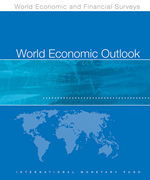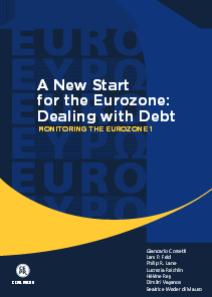European Central Bank, (2015), Financial Stability Review, Μάιος. Euro area financial system stress has remained low over the past six months, despite a certain increase in global financial market volatility. Broad-based indicators of financial market and banking system risk have generally fluctuated at low levels and stood in mid-May around the marks observed before the outbreak of the sovereign debt crisis (see Chart 1). The low overall level of financial …Read More
The Monetary Policy of the European Central Bank (2002-2015)
Miscossi, St., (2015), “The Monetary Policy of the European Central Bank (2002-2015)”, CEPS Special Report, 22 Μαΐου 2015. This paper examines the policies pursued by the European Central Bank (ECB) since the inception of the euro. The ECB was originally set up to pursue price stability, with an eye also to economic growth and financial stability as subsidiary goals, once the primary goal was secured. The application of a single …Read More
In It Together: Why Less Inequality Benefits All
OECD, (2015), In It Together: Why Less Inequality Benefits All, 21 Μαίου. The gap between rich and poor keeps widening. Growth, if any, has disproportionally benefited higher income groups while lower income households have been left behind. This long-run increase in income inequality not only raises social and political concerns, but also economic ones. It tends to drag down GDP growth, due to the rising distance of the lower 40% from …Read More
Critique of accommodating central bank policies and the ‘expropriation of the saver’: A review
Bindseil, Ulr., Clemens D., and Zeuner, J., (2015), “Critique of accommodating central bank policies and the ‘expropriation of the saver’: A review”, ECB Occasional Paper Series, N.161/May 2015. In parts of the German media, with the support of a number of German economists, the ECB’s low nominal interest rate policy is criticised as unnecessary, ineffective and as expropriating the German saver. This paper provides a review of the relevant arguments. It is …Read More
Financial integration in Europe: 2015
European Central Bank, (2015), Financial integration in Europe: 2015, Απρίλιος. Financial integration in the euro area has improved steadily and has reached a level close to that before the sovereign debt crisis Establishment of Banking Union and unconventional monetary policy actions taken by the ECB are major drivers of the improvement Financial integration is crucial for restoring efficient credit flows to the real economy Overall, financial integration in Europe has …Read More
Ετήσια Έκθεση της Ευρωπαϊκής Κεντρικής Τράπεζας
Ευρωπαϊκή Κεντρική Τράπεζα, (2015), Ετήσια Έκθεση, 2014. Από τη σκοπιά της νομισματικής πολιτικής, το περιβάλλον το 2014 ήταν πολύπλοκο. Η υποτονική ανάκαμψη που είχε ξεκινήσει το 2013 δεν επιταχύνθηκε όπως αναμενόταν. Η νομισματική επέκταση παρέμεινε συγκρατημένη και οι πιστώσεις συνέχισαν να συρρικνώνονται, αν και με σταδιακά βραδύτερο ρυθμό. Υπό συνθήκες χαμηλών εγχώριων πληθωριστικών πιέσεων, η σημαντική πτώση των τιμών του πετρελαίου από τα μέσα του 2014 οδήγησε σε περαιτέρω σημαντικές μειώσεις …Read More
Banking Stress Scenarios for Public Debt Projections
Benczur P., Berti K., Cariboni J., Di Girolamo Fr. Er., Langedijk Sv., Pagano Andr., Giudici M., (2015), “Banking Stress Scenarios for Public Debt Projections”, European Commission. The euro area sovereign debt crisis brought to light the potential risks to public finances posed by the banking sector. This paper simulates the potential impact of bank defaults on public finances based on stress test scenarios using an advance analytical methodology. Σχετικές αναρτήσεις …Read More
World Economic Outlook (WEO) Uneven Growth: Short- and Long-Term Factors
World Economic Outlook (WEO) Uneven Growth: Short- and Long-Term Factors, International Monetary Fund: World Economic and Financial Surveys, 15 Απριλίου 2015. Global growth remains moderate, with uneven prospects across the main countries and regions. It is projected to be 3.5 percent in 2015, in line with forecasts in the January 2015 World Economic Outlook (WEO) Update. Relative to last year, the outlook for advanced economies is improving, while growth …Read More
The crisis and its impact on unemployed people in Europe Qualitative survey in seven EU Member States
Paugam, S. (2015) “The crisis and its impact on unemployed people in Europe Qualitative survey in seven EU Member States“, Final report for the European Commission DG Employment, Social Affairs and Inclusion, 15 Απριλίου. As part of the package on “Coping strategies with crisis”, this study analyses experiences of unemployment in a recession and is based on a qualitative survey of a sample of over a hundred unemployed people from …Read More
A New Start for the Eurozone: Dealing with Debt – Monitoring the Eurozone 1
Corsetti, G., Feld, P. L., Lane, R. P., Reichlin, L., Rey, H., Vayanos, D. & Weder di Mauro, B. (2015) “A New Start for the Eurozone: Dealing with Debt – Monitoring the Eurozone 1“, Centre for Economic Policy Research, 15 Απριλίου. Foreword Recent Eurozone growth has been sporadic and hesitant, and confidence in the recovery is marred by concerns over returning financial instability and long periods of little or …Read More







